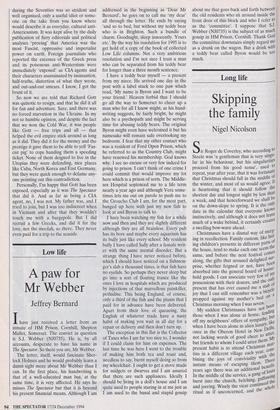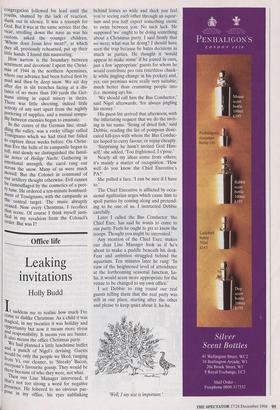Long life
Skipping the family
Nigel Nicolson
Christmases have a dismal way of merg- ing in recollection. Family custom, like hid- ing children's presents in different parts of the house, tend to make each one seem the same, and before the next festival conies along, the gifts that aroused delighted sur- prise, whether feigned or not, have been absorbed into the general hoard of house- hold goods. I can associate very few ef 1717 possessions with their donors, and the 0013; present that has ever caused me a stab 0 joy that I can still remember was a bieYelea propped against my mother's bed 00 Christmas morning when I was seven. n My saddest Christmases have not been those when I was alone at home, fending t u.e off my neighbours' offers of sympathy, when I have been alone in alien luxury, lia` once in the Oberon Hotel in New Dlhi' not lacking words of good cheer to utter, but friends to whom I could utter them• n'tY.. present habit is to attend Christmas III _ tins in a different village each year, e0n,_ bining the joys of conviviality with 01: instant means of escaping them, 115,..et years ago there was an additional benelit; In the middle of the service, a gang of lou. burst into the church, belching, guffawIng and jeering. Wisely the vicar continued the ritual as if unconcerned, and the whole congregation followed his lead until the youths, shamed by the lack of reaction, slunk out in silence. It was a triumph for God. But it was at the same service that the vicar, strolling down the nave as was his custom, asked the younger children, Whom does Jesus love most?', at which they all, previously rehearsed, put up their little hands. I found this nauseating. How narrow is the boundary between sentiment and devotion! I spent the Christ- mas of 1944 in the northern Apennines, Where our advance had been halted first by mud and then by deep snow. We sat day after day in slit trenches facing at a dis- tance of no more than 100 yards the Ger- mans sitting in equal misery in theirs. There was little shooting, indeed little activity of any sort apart from the nightly portering of supplies, and a mutual sympa- thy between enemies began to emanate. In the centre of the German line, strad- dling the valley, was a rocky village called Tossignano which we had tried but failed to capture three weeks before. On Christ- mas Eve the bells of its campanile began to toll, and slowly we distinguished the famil- iar notes of Heilige Nacht. Gathering in emotional strength, the carol rang out across the snow. Many of us were much moved. But the Colonel in command of our artillery thought otherwise. Evil cannot be camouflaged by the cosmetics of a pret- ty tune. He ordered a ten-minute bombard- ment of Tossignano, with the campanile as the central target. The music abruptly ceased. Now every Christmas, I recollect that . scene, Of course I think myself justi- fied in my revulsion from the Colonel's order. But was I?











































































































 Previous page
Previous page